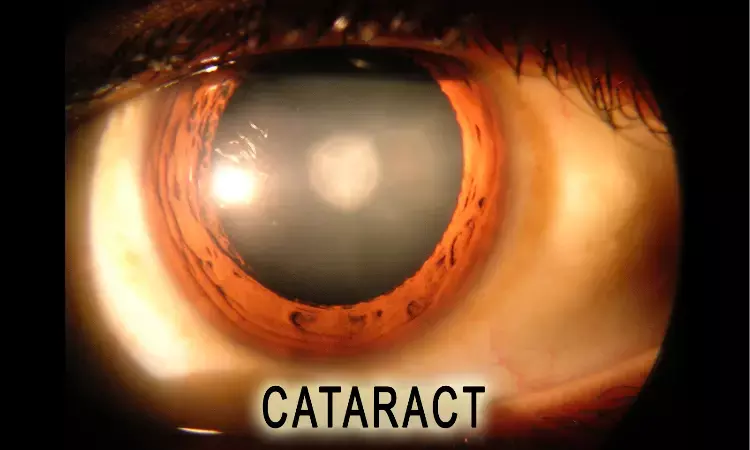- Home
- Medical news & Guidelines
- Anesthesiology
- Cardiology and CTVS
- Critical Care
- Dentistry
- Dermatology
- Diabetes and Endocrinology
- ENT
- Gastroenterology
- Medicine
- Nephrology
- Neurology
- Obstretics-Gynaecology
- Oncology
- Ophthalmology
- Orthopaedics
- Pediatrics-Neonatology
- Psychiatry
- Pulmonology
- Radiology
- Surgery
- Urology
- Laboratory Medicine
- Diet
- Nursing
- Paramedical
- Physiotherapy
- Health news
- Fact Check
- Bone Health Fact Check
- Brain Health Fact Check
- Cancer Related Fact Check
- Child Care Fact Check
- Dental and oral health fact check
- Diabetes and metabolic health fact check
- Diet and Nutrition Fact Check
- Eye and ENT Care Fact Check
- Fitness fact check
- Gut health fact check
- Heart health fact check
- Kidney health fact check
- Medical education fact check
- Men's health fact check
- Respiratory fact check
- Skin and hair care fact check
- Vaccine and Immunization fact check
- Women's health fact check
- AYUSH
- State News
- Andaman and Nicobar Islands
- Andhra Pradesh
- Arunachal Pradesh
- Assam
- Bihar
- Chandigarh
- Chattisgarh
- Dadra and Nagar Haveli
- Daman and Diu
- Delhi
- Goa
- Gujarat
- Haryana
- Himachal Pradesh
- Jammu & Kashmir
- Jharkhand
- Karnataka
- Kerala
- Ladakh
- Lakshadweep
- Madhya Pradesh
- Maharashtra
- Manipur
- Meghalaya
- Mizoram
- Nagaland
- Odisha
- Puducherry
- Punjab
- Rajasthan
- Sikkim
- Tamil Nadu
- Telangana
- Tripura
- Uttar Pradesh
- Uttrakhand
- West Bengal
- Medical Education
- Industry
Study finds reduced risk of cataracts associated with obesity surgery

New research presented at this year's European Congress on Obesity (held online 10-13 May) has found a reduced risk of eye cataracts occurring in patients who have lost weight through obesity (bariatric) surgery. The study is by Dr Theresa Burkard, ETH Zurich, Switzerland, and colleagues from Sweden and Switzerland.
A cataract is a cloudy obstruction in the lens of the eye, and a chronic condition which is a leading cause of visual impairment and blindness. A previous meta-analysis reported that overweight and obesity were risk factors for cataract development.[1] In this new study, the authors hypothesized that weight loss in patients with obesity may be associated with a lower incidence of cataract potentially due to decreased oxidative stress, less systemic inflammation, and remission of diabetes and hypertension in patients with those conditions.
They used data from Swedish nationwide healthcare registries in their analyses. Patients aged 40-79 years old who underwent obesity surgery between 2006 and 2019 were matched to bariatric surgery-free patients with obesity.
Statistical modelling was then used to calculate the risk of incident cataract among obesity surgery patients when compared to non-operated patients with obesity. A total of 22 560 obesity surgery patients were matched to 35 523 patients with obesity but no surgery. Patients were followed for a mean duration of around 6 years. The data showed that the risk of cataract was decreased by 29% in the obesity surgery group compared to matched patients with obesity but no surgery.
The risk of cataract development in obesity surgery patients compared to patients with obesity but no surgery increased with age: the lowest risk of cataract was observed in patients aged 40-49 years, where those who had obesity surgery were around half as likely to develop cataract compared to patients not having had obesity surgery. However, in patients aged 60 years or over, the beneficial effect seemed to disappear, with no significant difference in the risk of cataract between groups.
Furthermore, the authors observed that surgical techniques generally leading to higher weight loss and a higher risk of malabsorption of nutrients, such as duodenal switch or gastric bypass, were associated with the lowest risks of cataract (51% statistically non-significant decreased risk of cataract after duodenal switch, 32% statistically significant decreased risk of cataract after gastric bypass). Sleeve gastrectomy on the other hand, generally leads to slightly less weight loss and malabsorption of nutrients, and there was no difference in cataract risk between patients who underwent sleeve gastrectomy and those not undergoing bariatric surgery. The authors also observed no differences between sexes; both men and women yielded equally reduced cataract risk following bariatric surgery.
The authors conclude that "substantial weight loss is associated with a decreased risk of cataract, especially if obesity surgery was performed before age 60. This decreased risk is an addition to the multitude of positive effects that weight loss has on eye health. Furthermore, we observed a potential dose-response relationship between the amount of weight loss and reduction in cataract incidence."
Hina Zahid Joined Medical Dialogue in 2017 with a passion to work as a Reporter. She coordinates with various national and international journals and association and covers all the stories related to Medical guidelines, Medical Journals, rare medical surgeries as well as all the updates in the medical field. Email: editorial@medicaldialogues.in. Contact no. 011-43720751
Dr Kamal Kant Kohli-MBBS, DTCD- a chest specialist with more than 30 years of practice and a flair for writing clinical articles, Dr Kamal Kant Kohli joined Medical Dialogues as a Chief Editor of Medical News. Besides writing articles, as an editor, he proofreads and verifies all the medical content published on Medical Dialogues including those coming from journals, studies,medical conferences,guidelines etc. Email: drkohli@medicaldialogues.in. Contact no. 011-43720751


